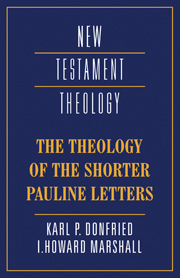We suggested that we could understand Paul's theology of the church in Philippians by examining, first of all, the foundation on which both his theological thinking and the church itself rests. The foundation can be regarded both as the gospel and as Jesus Christ himself.
Paul's central concern in his work is with what he calls ‘the gospel’ (1:5, 7, 12, 16, 27a and b; 2:22; 4:3, 15). The gospel is also called the ‘word’ (logos, 1:14) which brings ‘life’ (2:16). There is something called ‘the faith of the gospel’ (1:27b) which must mean ‘the faith prescribed by the gospel’, the response which is demanded by it. The Philippians must live in a manner that is worthy of the gospel (1:27a). Thus the gospel controls the life of both Paul and his readers.
When Paul speaks of the gospel he means: the Christian message and its content. But the content of the gospel is ‘preaching Christ (1:15, 17f.) – Christ is the basis of the individual Christian's life and of the communal life of the church.
It is not surprising, then, that Jesus Christ is central to Paul's thought in this letter. We may demonstrate this, admittedly in a rather superficial way, by noting that Jesus is mentioned by one form of name or another some forty-nine times; by contrast the word ‘God’ comes only twenty-four times and ‘Spirit’ five times.
